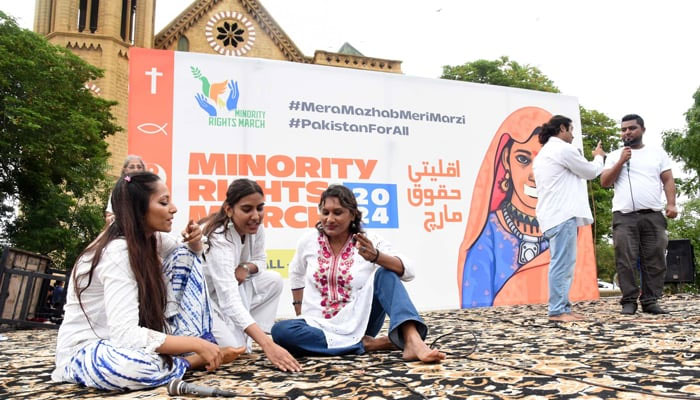Blueprint for tolerance
Forced conversions, lynchings and targeted killings of their communities are alarmingly common occurrences
Pakistan has long struggled to live up to its promise of equal rights for minorities. Though these rights are guaranteed by our constitution, the relevant provisions have never been fully implemented and persecution and discrimination against minorities remains widespread. Forced conversions of minority women, attacks by hateful lynch mobs and targeted killings of minorities and terror attacks on their communities have become alarmingly common occurrences. All this is enabled by a state apparatus that seems apathetic to the concerns of minorities at best and ever ready to placate and compromise with their tormentors at worst. As such, National Minorities Day, marked this past Sunday (August 11), serves as an enduring reminder of the state’s failure to live up to Quaid-e-Azam Muhammad Ali Jinnah’s promise to protect the rights and religious freedoms of minorities on August 11, 1947. Though the highest offices in the land, including the president and PM, were keen to remind us all about how committed they remain to protect minorities and how much they value them, the record shows otherwise and some recognition of how the state has systematically failed to live up to its promises would have been more appropriate.
Thankfully, this void was somewhat filled a day earlier on August 10 by Justice Syed Mansoor Ali Shah’s address at the 10th anniversary of the 2014 Supreme Court judgement on minority rights. Justice laid out a five-point plan offering a comprehensive approach to fostering a more tolerant and progressive nation. The five points include effective implementation of constitutional provisions, promotion of social harmony and tolerance through education and public awareness campaigns; equitable representation of minorities in all spheres of public life, including government, law enforcement and the judiciary; protection of the cultural and religious heritage of minority communities; and provision of avenues of redressal and support for minority communities facing injustice. These are all functions the state is currently struggling to perform and Justice Shah’s address elaborates on the measures that each of these points entails and how achieving them can create a more equal and inclusive Pakistan.
For instance, ensuring the effective implementation of constitutional provisions concerning minority rights is next to impossible without proactive measures to protect minorities from violence and discrimination and ensure that the perpetrators of these acts are brought to justice. The address also makes clear just how multi-faceted the task of protecting minority rights truly is. Achieving these goals will require a collective and coordinated effort from all major state institutions at the federal and provincial levels. A piecemeal approach to these five points is unlikely to work. For example, without adequate representation of minorities in key institutions, it will be harder to establish adequate avenues for redressal and to bring those who persecute and torment minorities to justice. A state where the communities being targeted are well-represented in the highest offices is much more likely to do both and do them better. But, at the end of the day, all structural change begins with will and consensus among the powers that be. Can those who have presided over an apparatus that has treated minorities with indifference, while at the same time being reluctant to bring those who have persecuted them to book, really be trusted with the task of building a better Pakistan for minorities?
-
 'Sinners' Star Recalls One Of The Coolest Scenes From Filming
'Sinners' Star Recalls One Of The Coolest Scenes From Filming -
 Eco-fashion Designer Amanda Navaian Sues King Charles Charity
Eco-fashion Designer Amanda Navaian Sues King Charles Charity -
 MGK's Flirty Comment On Megan Fox's Sultry Pics Fuels Reunion Buzz
MGK's Flirty Comment On Megan Fox's Sultry Pics Fuels Reunion Buzz -
 'He Was Really Reminiscing': Clinton Sparks Reactions After Being Caught Smiling At Epstein Photos
'He Was Really Reminiscing': Clinton Sparks Reactions After Being Caught Smiling At Epstein Photos -
 NASA Restructures Artemis Mission, Pushing First Lunar Landing To 2028
NASA Restructures Artemis Mission, Pushing First Lunar Landing To 2028 -
 Young Sebastian Bach: Wild Photos From His Long-haired Rock Star Era Amid Christina Applegate Confession
Young Sebastian Bach: Wild Photos From His Long-haired Rock Star Era Amid Christina Applegate Confession -
 Royal Family All Set To Show Unity As King Charles 'plans Abdication'
Royal Family All Set To Show Unity As King Charles 'plans Abdication' -
 Astronomers Spot Nearly Invisible Galaxy Packed With Dark Matter
Astronomers Spot Nearly Invisible Galaxy Packed With Dark Matter -
 Kim Jong Un Searches For Reason To Join Iran War In Viral Memes
Kim Jong Un Searches For Reason To Join Iran War In Viral Memes -
 Zach Braff Opens Up On Childhood Friendship With Singer Lauryn Hill
Zach Braff Opens Up On Childhood Friendship With Singer Lauryn Hill -
 Aryna Sabalenka Announces 'forever' With Partner Georgios
Aryna Sabalenka Announces 'forever' With Partner Georgios -
 Trump To Meet Tech Giants: White House Energy Pledge Aims To Shield Consumers Ahead Of Midterms
Trump To Meet Tech Giants: White House Energy Pledge Aims To Shield Consumers Ahead Of Midterms -
 Meghan Markle, Prince Harry Believe They Could Help King Charles, William As Royals Face Major Crisis
Meghan Markle, Prince Harry Believe They Could Help King Charles, William As Royals Face Major Crisis -
 Rob Rauscha Steps Away From Reality TV After 'The Traitors' Triumph: 'It's Not A Life I Want'
Rob Rauscha Steps Away From Reality TV After 'The Traitors' Triumph: 'It's Not A Life I Want' -
 Val Chmerkovskiy Shares Message With Fans After Hospitalization: 'Thank God, No Brain Tumour'
Val Chmerkovskiy Shares Message With Fans After Hospitalization: 'Thank God, No Brain Tumour' -
 China Achieves Breakthrough In High-speed Satellite-to-ground Laser Communication
China Achieves Breakthrough In High-speed Satellite-to-ground Laser Communication




